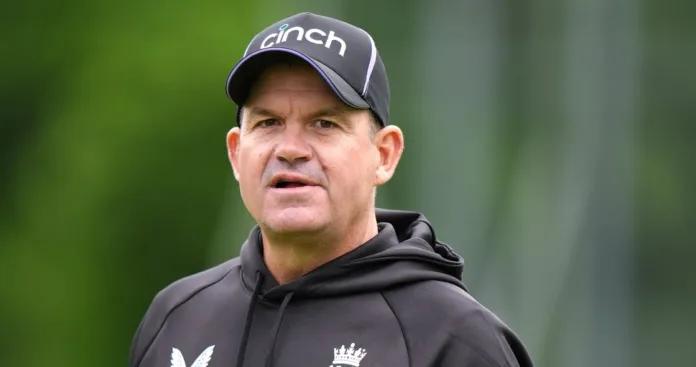England’s cricket shake-up sees head coach Matthew Mott step down, with Jos Buttler retained as captain despite recent setbacks and questionable decisions.
After England‘s semi-final loss to India in the men’s T20 World Cup last month, head coach Matthew Mott expressed optimism about his partnership with captain Jos Buttler. However, this optimism was not enough to secure his position. Mott stepped down following separate discussions with Rob Key, the men’s team director, and Buttler remains as captain, with Marcus Trescothick stepping in as interim head coach for the upcoming series against Australia in September.
Mott and Buttler’s tenure began promisingly, with England winning both the 50-over World Cup in 2019 and the T20 equivalent under their predecessors. However, recent performances have been disappointing, including a poor showing in India where they lost six out of seven group games. Key, who initially brought Mott on board to continue England’s white-ball success, decided to part ways with him after further setbacks in the T20 World Cup in the Caribbean.
Players have privately expressed concerns about mixed messaging and unclear tactics, with some feeling constrained rather than empowered to play freely. This feedback, combined with disappointing results, led to the decision to replace Mott, even as questions arise about Buttler’s continued role as captain.
Buttler, a key figure in England’s white-ball success, has faced criticism for his leadership, particularly for decisions during critical matches. His choice to bowl first in scorching heat against South Africa and his tactical choices against India have been questioned. Additionally, his performance with the bat has not met expectations, and there are concerns about whether captaining from behind the stumps is the best approach for him.
The decision to retain Buttler as captain appears influenced by a lack of viable alternatives and his significant status within the team. While he remains a top player, the demands of captaincy may be affecting his performance and enjoyment of the role. The cramped schedule also complicates finding a successor, as key players like Harry Brook are not available for all series due to overlapping commitments.
Looking ahead, England needs a strategic reboot in their white-ball setup, with Key aiming for a “new direction.” The choice of a new head coach will be crucial, with potential candidates including Marcus Trescothick, Kumar Sangakkara, Mike Hussey, and Kieron Pollard. Whoever takes on the role will need to establish a strong working relationship with Buttler to steer the team toward success in upcoming tournaments, such as the 2025 Champions Trophy and the 2027 World Cup.
Analysis
Political
The decision to part ways with Matthew Mott and retain Jos Buttler highlights a critical juncture for England’s cricket leadership. Politically, this move suggests a willingness by the England and Wales Cricket Board (ECB) to make significant changes in pursuit of maintaining their competitiveness on the global stage. It also indicates a bet on continuity in captaincy with Buttler, banking on his experience and influence within the team to navigate this transitional phase.
Social
Socially, the shake-up reflects broader discussions about leadership and accountability in sports. Buttler’s retention despite recent setbacks may spark debates about meritocracy and the criteria used for leadership positions. The narrative around Buttler’s tenure can influence public perceptions of leadership in sports, particularly in terms of how past achievements weigh against current performance. This decision may also impact fan sentiment and support, which are crucial for maintaining the sport’s popularity and the team’s morale.
Racial
The choices surrounding the coaching and captaincy roles also touch on issues of diversity within cricket. While the current focus is primarily on performance and leadership dynamics, the broader context includes ongoing discussions about inclusivity and representation in cricket. The selection of a new head coach presents an opportunity to consider candidates from diverse backgrounds, potentially enriching the team’s cultural and strategic dimensions. Such considerations are part of a broader movement towards greater diversity and inclusion within the sport, both on and off the field.
Gender
While the current situation primarily involves men’s cricket, it indirectly influences the broader context of gender in sports leadership. The visibility and scrutiny of leadership roles in men’s cricket can impact perceptions and expectations in women’s cricket, where discussions around leadership, representation, and equality are equally important. This situation may serve as a reference point for how leadership changes are managed and communicated across all levels of the sport, including women’s teams.
Economical
Economically, the changes in leadership can have significant implications for England’s cricket finances. The team’s performance directly affects sponsorship deals, broadcast rights, and merchandise sales. A successful team under strong leadership can boost revenue and attract more investment, while prolonged instability or poor performance can have the opposite effect. Additionally, the choice of head coach, particularly if it involves high-profile international figures, can impact the financial dynamics of the ECB, including the allocation of resources between the men’s and women’s teams and grassroots development.
